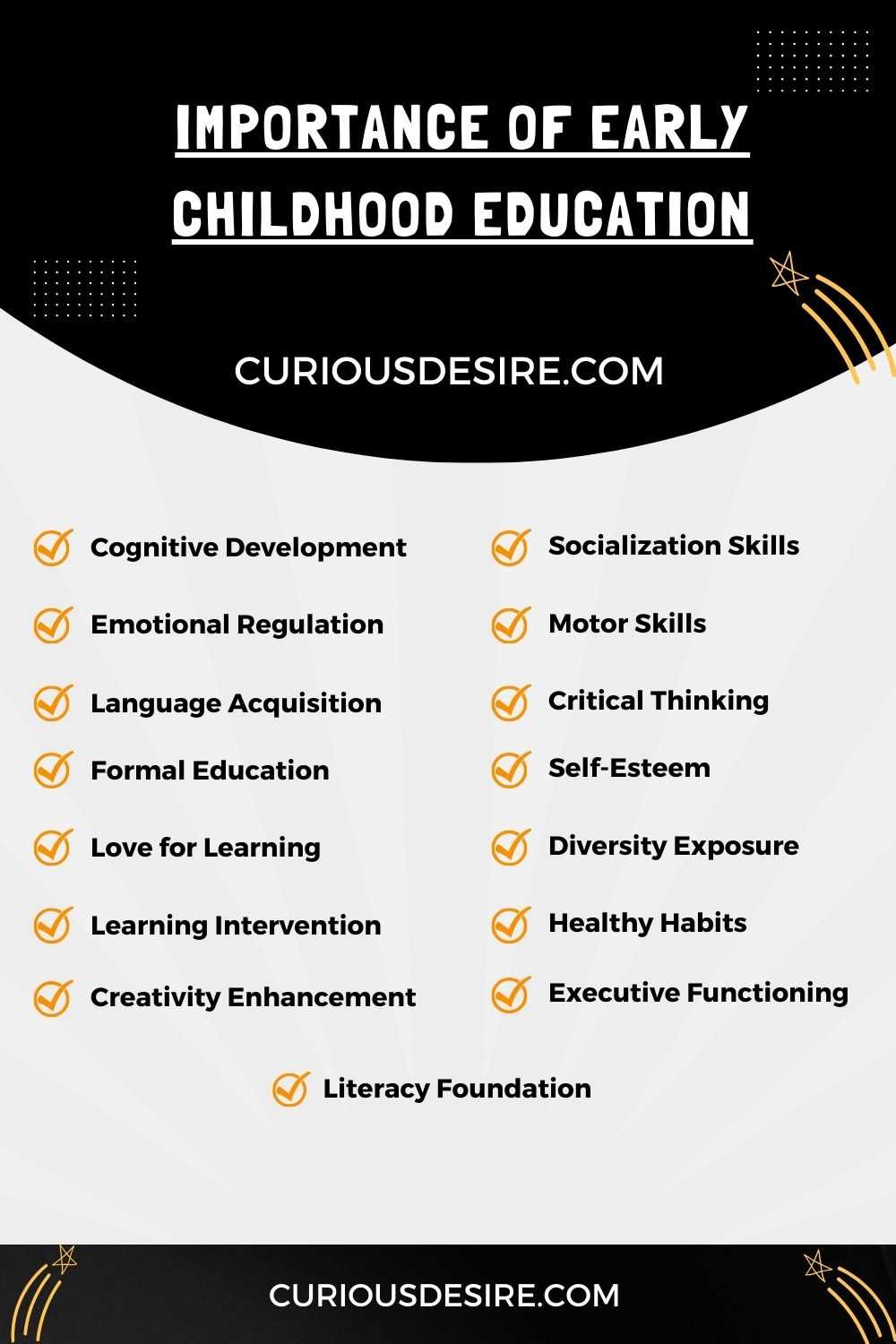Early childhood education is incredibly important for young children as it sets the stage for their future success and development.
During these formative years, children learn important skills and behaviors that will shape their academic achievements, social interactions, and overall well-being throughout their lives.
Providing quality early education opportunities ensures that children have a strong foundation upon which to build their knowledge, confidence, and abilities as they grow.
In this article, we’ll explore why early childhood education matters and the significant impact it has on children’s lives and society as a whole.
Here are the 5 common reasons for the importance of early childhood education:
1. Cognitive Development
Early childhood education gives kids a strong start, like the first step to a great adventure. It helps them become better thinkers and problem solvers. When they do fun stuff like puzzles and stories, their brains get stronger.
This not only makes school easier but also makes them feel really smart and confident. As they start learning early, everything becomes less tricky for kids. Good learning experiences help them handle tough things in school and life.
This not only improves their grades but also boosts their confidence. And guess what? When kids feel good about what they learn, it’s like magic. It helps them get along with others and make friends easily.
Learning early helps them talk and share their thoughts, making them healthier in their minds and bodies. So, early learning isn’t just about school; it’s about setting kids up for a happy and successful life.
2. Socialization Skills
The development of socialization skills in early childhood is important for kids as it builds the foundation for positive friendships and a sense of belonging.
Engaging in activities like group play and teamwork, such as building blocks together or playing team games, allows children to learn important skills like cooperation and communication.
For example, when children collaborate on creating something or playing a game, they develop these important social abilities.
This early exposure to social skills boosts children’s confidence, prepares them for future relationships, and contributes to overall well-being, empowering them to handle life’s social challenges as they grow.
3. Emotional Regulation
Teaching emotional regulation in early childhood education is important for helping children manage their feelings.
Through activities that encourage self-expression and discussions about emotions, kids learn to understand and control how they feel.
For instance, when children learn to express their emotions appropriately, such as talking about what makes them happy or sad, it:
- Sets the foundation for better coping with challenges
- Builds resilience in dealing with life’s ups and downs
- Promotes positive emotional well-being throughout their lives
This early exposure to emotional regulation equips children with important tools for handling life’s ups and downs, promoting their mental health as they grow.
4. Language Acquisition
Language acquisition in early childhood education is important for effective communication and cognitive development.
Learning a language at a young age not only helps children express their thoughts and needs but also enhances their ability to understand and learn new concepts.
For example, this process is like learning the secret code of talking and understanding, whether English, German, or any language. As children start saying words like “mom” or “play,” it unlocks a whole new world for them.
They can now communicate with friends, interpret the meaning of stories, and excel in school by following what the teacher says. This early language learning sets the stage for a lifetime of communication and continuous learning.
5. Motor Skills Development
Motor skills development is important in early childhood as it enhances physical coordination and cognitive abilities.
Through activities like drawing, playing with building blocks, and engaging in outdoor play, children develop both fine and gross motor skills. This not only prepares them for everyday tasks but also supports their academic success.
For instance, when kids learn to hold a pencil or catch a ball, it lays the groundwork for more complex activities, such as writing and participating in sports, contributing to their overall development and well-being.
This prepares them for academic challenges and equips them with valuable tools to navigate various situations they encounter in their everyday lives.
6. Critical Thinking Skills
Critical thinking skills in early childhood education play an important role in helping children handle life’s challenges. These skills make kids excellent problem solvers, helping them to understand things better and find solutions.
For example, when faced with a puzzle, children with strong critical thinking skills can analyze the situation, figure out the right pieces, and piece them together successfully.
This not only prepares them for academic challenges, such as solving complex problems in math or science but also equips them with valuable tools to navigate various situations they encounter in their everyday lives.
Whether it’s figuring out how to share toys with friends or finding creative solutions to everyday problems, critical thinking becomes a valuable asset in shaping a child’s ability to approach and overcome life challenges with confidence.
7. Preparation for Formal Education
Preparation for formal education is important as it gets children ready for big-kid school. Early childhood education teaches kids the basics, like letters and numbers, making it easier for them to learn more complex stuff later.
For instance, when children know their ABCs and 123s, it’s like having a superhero power that helps them succeed when they go to school.
Pre-learning these basics not only enhances their cognitive abilities but also gives them a head start in understanding more advanced concepts, making their educational journey smoother and more enjoyable.
8. Establishing a Love for Learning
Establishing a love for learning is vital because it makes children excited about discovering new things. When kids love learning, it’s like having a treasure hunt every day.
For example, when children find joy in reading a story or exploring nature, it sets the stage for a lifelong love of learning, making their education journey fun and fulfilling.
9. Building Self-Esteem
Building self-esteem in early childhood education is like giving kids a strong belief in themselves. When children feel good about who they are, it helps them do better in many things.
For example, when praised for completing a drawing or solving a puzzle, children’s confidence grows, making them more willing to try new things.
This positive self-image nurtured in early childhood lays the foundation for a resilient and confident individual.
10. Exposure to Diversity
Exposure to diversity in early childhood education means introducing children to different people, cultures, and ideas. It’s like opening a colorful box of crayons, each representing something unique and special.
For example, when kids learn about traditions from around the world or interact with friends from diverse backgrounds, it helps them understand and appreciate differences.
This exposure is important as it promotes a sense of acceptance, tolerance, and curiosity, preparing children to embrace a world rich in diversity and contributing to the development of open-minded and empathetic individuals.
11. Formation of Healthy Habits
Early childhood education plays a vital role in promoting healthy habits by introducing children to practices like daily teeth brushing and choosing nutritious foods.
Educators provide essential tools for body care, empowering children to prioritize their well-being.
Through engaging activities and guidance, children not only learn to make healthy choices but also prevent potential health issues, ensuring their physical fitness and overall health.
The early focus on these habits in an educational setting sets the foundation for a healthy and fulfilling life as children grow up.
12. Early Intervention for Learning Disabilities
Early intervention for learning disabilities in early childhood education is about helping kids who find some things harder than others. It’s like giving extra help when needed, so they can learn and succeed.
For example, when teachers notice a child needs a bit more support with reading or numbers, they provide special help early on. This helps the child do better in school and feel confident in their abilities.
13. Enhancing Creativity
Encouraging creativity in children involves providing them with opportunities to explore their imagination freely, whether through art, play, or other creative activities.
By allowing kids to engage in activities like drawing, building, storytelling, or inventing games, they develop critical thinking skills and learn to approach challenges with innovative solutions.
For instance, when children are encouraged to express themselves creatively, such as through crafting imaginative stories or constructing elaborate structures with building blocks, they not only get smarter but also feel more confident in themselves.
Encouraging creativity helps kids become better problem-solvers and thinkers, so they can handle tricky situations with cleverness and determination.
14. Strengthening Executive Functioning
Strengthening executive functioning in early childhood education is like training the brain to be good at planning and getting things done. It’s about learning how to organize and remember things, just like fine-tuning a machine to run smoothly.
It’s a journey of learning to organize thoughts and memories efficiently, laying the groundwork for effective decision-making and responsibility.
By engaging in activities like tidying up after play or following a basic schedule, children not only sharpen their task management skills but also develop a sense of accountability.
15. Establishing a Strong Foundation for Literacy
Establishing a strong foundation for literacy in early childhood education is important for kids to learn to read and write, like taking the first steps on an exciting reading adventure.
For example, when children start recognizing letters and hearing stories, such as reading bedtime tales with their parents, it sets them on the path to becoming great readers.
This early literacy foundation helps them understand things better in school and enjoy stories for a lifetime, boosting their academic success and promoting a love for learning.
Conclusion
Early childhood education lays the groundwork for a child’s future success, providing a nurturing space for exploration and growth. Through age-appropriate activities, kids develop vital skills like communication and problem-solving.
Quality early education positively affects academic achievement, career paths, and lifelong well-being. Children who receive such education are better prepared for school, higher education, and future challenges.
Investing in early childhood education benefits both individual children and society, building stronger communities and ensuring a brighter future for all.
Importance of Early Childhood Education FAQs
1. What makes early childhood education important?
Early childhood education helps kids learn essential skills like sharing and problem-solving, setting them up for success in school and life.
2. How do children benefit from early childhood education?
Children develop crucial social, emotional, and cognitive skills through activities like playing, reading, and interacting with others.
3. What role do teachers play in early childhood education?
Teachers create a supportive environment where children can learn and grow, fostering their curiosity and creativity.
4. How does early childhood education prepare children for school?
Early education introduces kids to basic concepts like numbers, letters, and colors, helping them feel confident and ready to learn when they start school.
5. What are the long-term effects of quality early childhood education?
Quality early education can lead to higher academic achievement, better job opportunities, and improved health outcomes later in life.
6. How does early childhood education promote social skills?
Through play and group activities, children learn how to cooperate, share, and communicate effectively with their peers.
7. What resources are available for parents interested in early childhood education?
Parents can access books, online resources, and community programs to learn about early childhood development and how to support their child’s learning.
8. How can communities support early childhood education?
Communities can invest in high-quality preschool programs, provide resources for families, and promote awareness of the importance of early education for all children.


